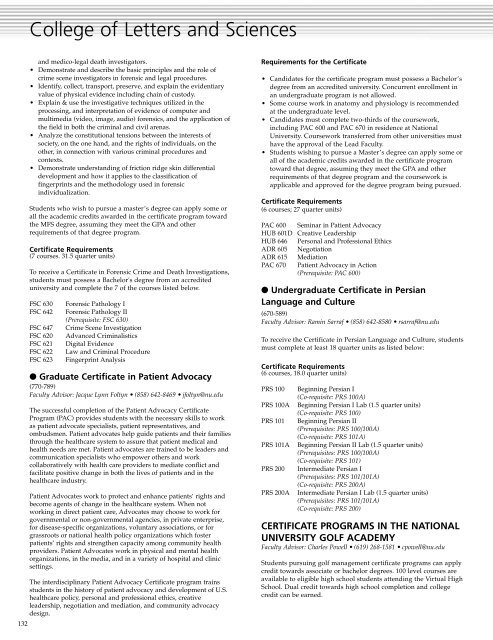Catalog 73 - National University
Catalog 73 - National University
Catalog 73 - National University
- No tags were found...
You also want an ePaper? Increase the reach of your titles
YUMPU automatically turns print PDFs into web optimized ePapers that Google loves.
College of Letters and Sciencesand medico-legal death investigators.• Demonstrate and describe the basic principles and the role ofcrime scene investigators in forensic and legal procedures.• Identify, collect, transport, preserve, and explain the evidentiaryvalue of physical evidence including chain of custody.• Explain & use the investigative techniques utilized in theprocessing, and interpretation of evidence of computer andmultimedia (video, image, audio) forensics, and the application ofthe field in both the criminal and civil arenas.• Analyze the constitutional tensions between the interests ofsociety, on the one hand, and the rights of individuals, on theother, in connection with various criminal procedures andcontexts.• Demonstrate understanding of friction ridge skin differentialdevelopment and how it applies to the classification offingerprints and the methodology used in forensicindividualization.Students who wish to pursue a master’s degree can apply some orall the academic credits awarded in the certificate program towardthe MFS degree, assuming they meet the GPA and otherrequirements of that degree program.Certificate Requirements(7 courses. 31.5 quarter units)To receive a Certificate in Forensic Crime and Death Investigations,students must possess a Bachelor's degree from an accrediteduniversity and complete the 7 of the courses listed below.FSC 630FSC 642FSC 647FSC 620FSC 621FSC 622FSC 623Forensic Pathology IForensic Pathology II(Prerequisite: FSC 630)Crime Scene InvestigationAdvanced CriminalisticsDigital EvidenceLaw and Criminal ProcedureFingerprint Analysis● Graduate Certificate in Patient Advocacy(770-789)Faculty Advisor: Jacque Lynn Foltyn • (858) 642-8469 • jfoltyn@nu.eduThe successful completion of the Patient Advocacy CertificateProgram (PAC) provides students with the necessary skills to workas patient advocate specialists, patient representatives, andombudsmen. Patient advocates help guide patients and their familiesthrough the healthcare system to assure that patient medical andhealth needs are met. Patient advocates are trained to be leaders andcommunication specialists who empower others and workcollaboratively with health care providers to mediate conflict andfacilitate positive change in both the lives of patients and in thehealthcare industry.Patient Advocates work to protect and enhance patients’ rights andbecome agents of change in the healthcare system. When notworking in direct patient care, Advocates may choose to work forgovernmental or non-governmental agencies, in private enterprise,for disease-specific organizations, voluntary associations, or forgrassroots or national health policy organizations which fosterpatients’ rights and strengthen capacity among community healthproviders. Patient Advocates work in physical and mental healthorganizations, in the media, and in a variety of hospital and clinicsettings.The interdisciplinary Patient Advocacy Certificate program trainsstudents in the history of patient advocacy and development of U.S.healthcare policy, personal and professional ethics, creativeleadership, negotiation and mediation, and community advocacydesign.132Requirements for the Certificate• Candidates for the certificate program must possess a Bachelor’sdegree from an accredited university. Concurrent enrollment inan undergraduate program is not allowed.• Some course work in anatomy and physiology is recommendedat the undergraduate level.• Candidates must complete two-thirds of the coursework,including PAC 600 and PAC 670 in residence at <strong>National</strong><strong>University</strong>. Coursework transferred from other universities musthave the approval of the Lead Faculty.• Students wishing to pursue a Master’s degree can apply some orall of the academic credits awarded in the certificate programtoward that degree, assuming they meet the GPA and otherrequirements of that degree program and the coursework isapplicable and approved for the degree program being pursued.Certificate Requirements(6 courses; 27 quarter units)PAC 600 Seminar in Patient AdvocacyHUB 601D Creative LeadershipHUB 646 Personal and Professional EthicsADR 605 NegotiationADR 615 MediationPAC 670 Patient Advocacy in Action(Prerequisite: PAC 600)● Undergraduate Certificate in PersianLanguage and Culture(670-589)Faculty Advisor: Ramin Sarraf • (858) 642-8580 • rsarraf@nu.eduTo receive the Certificate in Persian Language and Culture, studentsmust complete at least 18 quarter units as listed below:Certificate Requirements(6 courses, 18.0 quarter units)PRS 100PRS 100APRS 101PRS 101APRS 200PRS 200ABeginning Persian I(Co-requisite: PRS 100A)Beginning Persian I Lab (1.5 quarter units)(Co-requisite: PRS 100)Beginning Persian II(Prerequisites: PRS 100/100A)(Co-requisite: PRS 101A)Beginning Persian II Lab (1.5 quarter units)(Prerequisites: PRS 100/100A)(Co-requisite: PRS 101)Intermediate Persian I(Prerequisites: PRS 101/101A)(Co-requisite: PRS 200A)Intermediate Persian I Lab (1.5 quarter units)(Prerequisites: PRS 101/101A)(Co-requisite: PRS 200)CERTIFICATE PROGRAMS IN THE NATIONALUNIVERSITY GOLF ACADEMYFaculty Advisor: Charles Powell • (619) 268-1581 • cpowell@nu.eduStudents pursuing golf management certificate programs can applycredit towards associate or bachelor degrees. 100 level courses areavailable to eligible high school students attending the Virtual HighSchool. Dual credit towards high school completion and collegecredit can be earned.
















